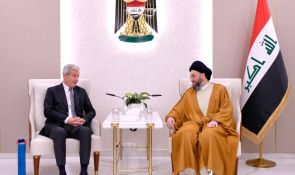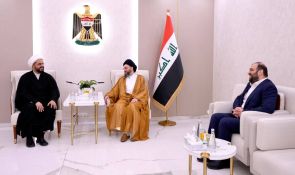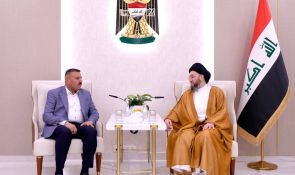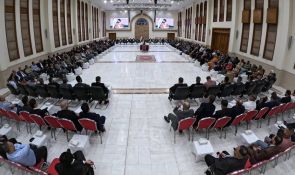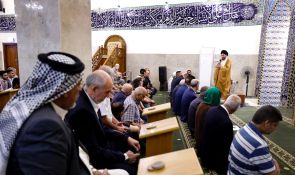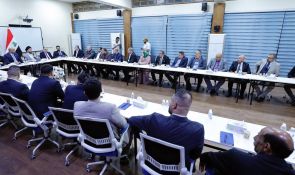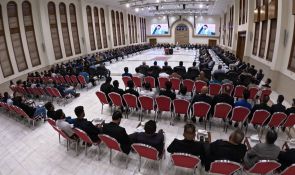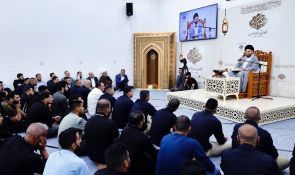Sayyid Ammar al-Hakim said, “The just modern state moves towards the future, interacts with the variables, renewing its means within the justice criterion.”
Sayyid Ammar al-Hakim, Head of the Islamic Supreme Council of Iraq (ISCI), stressed that the plan to build the successful modern state, which the Movement of the Martyr of the Niche adopts, is the prelude for safeguarding the citizen’s dignity, calling on the male and female public speakers to familiarize people with this vision and stressing that the modern state moves towards the future and renews its methods in synch with the entitlements of this future. Its trendiness is derived from Islam’s philosophy which is capable of acclimation, flexibility and the providing of solutions. He explained that trendiness does not mean what is modern versus what is old. Rather, trendiness is a status of renewing and interacting with life where there is no stagnation. This came up in the speech of His Eminence in the 23rd conference of Hussaini male and female speakers which was sponsored by the Foundation of the Martyr of the Niche in al-Najaf al-Ashraf on Friday, November 9, 2012.
His Eminence stressed that justice is a compass in the movement of the modern state that always points towards achieving justice. This requires the existence of officials who are characterized with justice. He stressed that the successful modern state is not a slogan submitted but a plan that aims at changing the society’s reality, explaining that the style of the Movement of the Martyr of the Niche is to employ launching initiatives then turning them into legislations and measures that serve the citizen, stressing that the success of the plan needs people who believe in it, and it needs alliances that usher it.
The Head of the Islamic Supreme Council of Iraq pointed out to the Hussaini pulpit being the venue for acquainting people with the Hussaini issue. A speaker is an articulating tongue that explains its dimensions, explaining that male and female missionaries, male and female public speakers, are two wings that complement each other, stressing the necessity for every Hussaini speaker to be characterized with credibility and reality, that such a speaker is characterized by acting on what he says, and that action is what calls people for reform. He advocated familiarizing people with their rights, including the right to participate in the social and political life as a right which must not be relinquished, stressing the necessity of acquainting people with the importance of the electoral participation and with the criteria of election by voting for the honest and competent person who can change the reality to what is best.
His Eminence explained that the speaker’s tasks can be summarized by the call to guidance and patience with people during the latter’s tribulations and when harmed, stressing that those who call to Allah have a lofty status envied by prophets according to narratives. Moreover, such callers open people’s eyes to the truth. He stressed the necessity of the speakers to be characterized by objectivity and renewal because they aim at Allah loving His servants, and at the servants loving Allah, the most Praised and Exalted One.
Sayyid Ammar al-Hakim stressed the necessity for the address to be characterized by harmony with people’s concerns and aspirations, that the address must be a balsam for people’s wounds, stressing the role of the Hussaini pulpit in reforming people because Imam al-Hussain (Ú) marched out in order to reform the society. He explained that when hearts are comforted, they become a venue to address the minds, and this requires the speaker to know what he says, when he says what he says, and how he says what he says, so that his speech will be effective, terse, wise and lenient. He stressed the necessity for the Hussaini address to take note of the youths since they are an important and big segment, calling for awarding this segment a special treatment so that the Islamic and Hussaini identity may deepen in it because they are the hope for the future.
His Eminence called on the male and female public speakers to acquaint people with the juristic culture, to be interested in it, and to stress the importance of prayers, of performing them on time, and on focusing on the merits of congregational prayer services. He called for letting prayers enter public places such as schools and universities without coercing or politicizing. He also called on them to acquaint people with the merits of paying the zakat dues, its relationship with bliss, and the necessity of contemplating on the Qur’an because it reprimands people who do not pay the zakat.
It must be pointed out that this conference witnessed the attendance of a very large number of Hussaini male and female speakers as well a representatives of the highest religious authorities (maraji`) in Iraq.


